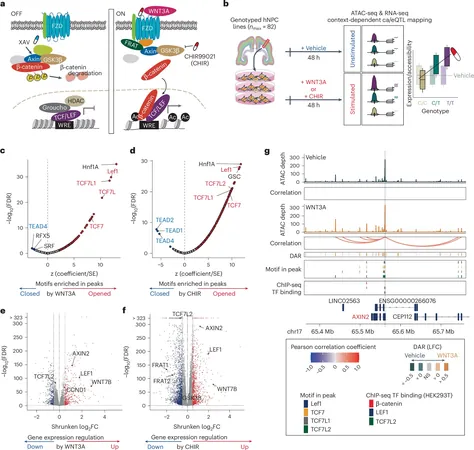
Revolutionary Live-Cell Model Decodes Genetic Risks for Major Psychiatric Disorders!
2024-10-03
Author: Yu
Revolutionary Live-Cell Model Decodes Genetic Risks for Major Psychiatric Disorders!
In a groundbreaking study, scientists have unveiled the mysterious genetic links to psychiatric disorders, revealing the hidden complexities of our DNA. Researchers at the esteemed UNC School of Medicine have developed an innovative live-cell model system that allows for an unprecedented deep dive into our genetic make-up, pinpointing specific variants tied to conditions such as schizophrenia, autism spectrum disorder, and bipolar disorder.
The pioneering work is led by Dr. Jason Stein, an associate professor of genetics and member of the UNC Neuroscience Center. The findings, published in the prestigious journal Nature Neuroscience, shed light on how intricately our genetic code influences neurological health.
For years, genetic variants—subtle differences in our DNA—were known to influence the likelihood of developing mental health disorders, but the underlying mechanisms were largely obscured. “There are hundreds of genetic loci associated with psychiatric conditions, yet their functions remain elusive,” said Dr. Stein. His research aims to decode these complex regions of the genome, many of which reside in non-coding areas that do not directly translate into proteins.
Intriguingly, only about 3% of our genome is responsible for protein coding, while the remaining 97% consists of non-coding regions where many psychiatric-related variants lie. These non-coding variants act like “light switches,” capable of activating or deactivating genes that have concrete functions within our bodies. However, elucidating how these variants act has been exceedingly challenging for researchers. Their effects are often context-dependent, meaning they only manifest under specific cellular conditions.
To navigate this intricacy, Stein’s team harnessed neural progenitor cells, critical players in brain development. By leveraging diverse cell lines with different genetic backgrounds, researchers could observe the nuanced responses of genetic variants in both active and inactive states. They exposed these stem cells to various chemical compounds to stimulate the Wnt signaling pathway, a vital cascade influencing brain development.
The results were astounding! The team identified thousands of non-coding genetic variants exhibiting context-dependent functions, particularly linked to schizophrenia risk. “This discovery is a significant leap forward in deciphering the genetic underpinnings of neuropsychiatric disorders,” Dr. Stein noted.
The implications of this research extend beyond understanding psychiatric risks. Similar methodologies utilizing this live-cell model could pave the way for assessing genetic variations' impacts on environmental exposures—like lead—and their effects on the brain. Moreover, this breakthrough could revolutionize psychological treatment, allowing for a more personalized approach based on a patient’s unique genetic profile.
Co-first authors contributing to this pivotal study include research associate Nana Matoba, post-doctoral fellow Brandon D. Le, and graduate student Jordan M. Valone, who collectively led this fascinating exploration into the genetic basis of mental health.
Stay tuned as this promising research continues to unfold, potentially transforming our approach to understanding and treating psychiatric disorders.


 Brasil (PT)
Brasil (PT)
 Canada (EN)
Canada (EN)
 Chile (ES)
Chile (ES)
 España (ES)
España (ES)
 France (FR)
France (FR)
 Hong Kong (EN)
Hong Kong (EN)
 Italia (IT)
Italia (IT)
 日本 (JA)
日本 (JA)
 Magyarország (HU)
Magyarország (HU)
 Norge (NO)
Norge (NO)
 Polska (PL)
Polska (PL)
 Schweiz (DE)
Schweiz (DE)
 Singapore (EN)
Singapore (EN)
 Sverige (SV)
Sverige (SV)
 Suomi (FI)
Suomi (FI)
 Türkiye (TR)
Türkiye (TR)